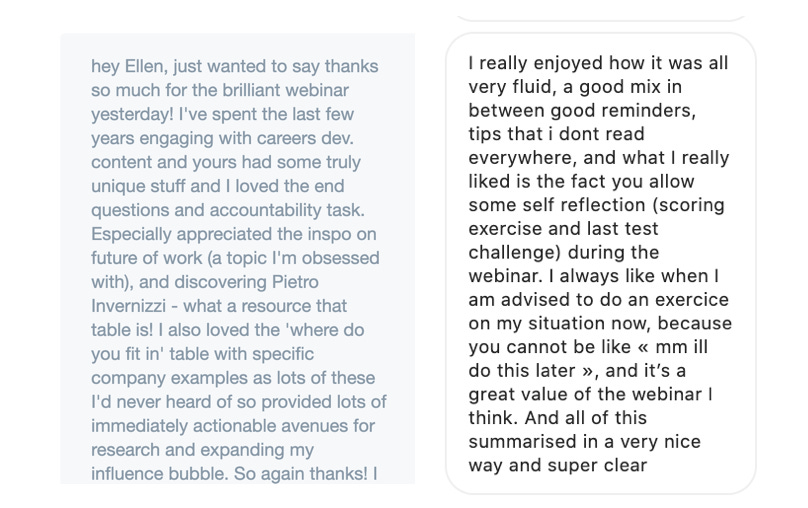How do you best understand and communicate your key skills?
3 different types of skills you need to know about, and how to assess yours, especially when changing career path.
Hi folks — another week another question answered!
It was a struggle to choose what to write on this week with many ideas from my first webinar, we covered a lot of ground including:
What the future looks like in a post-pandemic world (what jobs will and won’t be needed & how to equip yourself effectively)
How to identify what is & isn’t working in your career, and how you can use that information to inform your career search & make better decisions
The toolkit you need to keep you focused on the right things when making changes
How to assess & communicate your skills effectively
How to choose between being an employee, a freelancer, and an entrepreneur
The biggest mindset shifts you need to make to be successful at work
Here are some kind follow-up notes I’ve received so far:
There have been a few requests from people who missed it for another one.
If that’s you or you’re hearing about it for the first time and want to learn about the above, please register below.
From the above, this newsletter explores skills in more depth. So let’s get started.
The three types of skills
Whether you’re off to a job interview or just want to take stock of what you’ve got going for you, I invite you to reflect on your skills as we go through this list.
When noting yours down, focus only on those which fulfill the following three criteria:
You enjoy using this skill
You have decent experience in this skill, with sufficient examples to refer to
It is in high demand (this is relative, but use your best judgment)
Functional Skills
Functional skills are those which are transferrable across any industry or environment.
So even if you work in hospitality right now, these skills would be applicable within another industry, from healthcare to pharmaceuticals.
Functional skills are applicable to many walks of life for example:
Presenting
Research
Customer Service
Writing
Analysis
Teaching
TIP: Consider the context in which you are good at or enjoy this skill, for more powerful self-knowledge. Writing a news report is different to writing creative fiction, for example. And writing under tight deadlines is different to journalling.
List yours (remember the 3 criteria above). Remember more isn’t necessarily better here. What’s more important is the depth of experience you have with this skill, especially if you are switching industries it helps to have lots of examples of using this skill to speak from.
Special Knowledge
Unlike the above, special knowledge does tend to be industry or domain-specific.
Special knowledge is anything you’ve trained, studied, or practiced frequently. They are things you have typically learned on the job or at school.
Examples include:
Graphic design
Nuclear physics
Accountancy
Spanish
Instagram
SEO
Recruiting
TIP: Like the above, the more specific you can be the better e.g Instagram for small retailers or Accounting for Global Oil Companies. If you’re a specialist you can generally command more money for your expertise than a generalist can.
Aim for as many skills as you can possibly think of within the context of where you’re going next. Your ancient history knowledge may be less relevant for your fashion career (however, some of your functional skills gained here like analyzing global events might be helpful).
Self Management Traits
These are personality or behavioral traits you exhibit. Not skills so much as ways of being.
Your traits are likely displayed outside of work contexts too as they are innate to who you are.
Examples:
Cooperative
Empathetic
Resilient
Punctual
Disciplined
Adaptable
TIP: You may want to ask people in your life who know you well what they consider your top traits/attributes. What are you known for?
Again more isn’t necessarily better here. Really think through the things you are excellent at, these are your defining factors, your personal brand. Definitely don’t list things for the sake of saying something you think sounds appealing, unless you can give examples of it from your personal/work life. You want to be authentic here.
How do you communicate these skills?
Whether you’re off for a job interview, brushing up your skills, or generally seeking self-awareness perhaps for starting or scaling your own business, you want to list your skills in a way that communicates confidence, clarity, and expertise.
Even if you’re early in your career you’ll have honed skills from other parts of your life that you can bring to life with enough practice. As we anything, practice makes perfect. Practice analysing and describing your skills, on paper and out loud.
Pull together an inventory together of times you’ve used certain skills, from university extra-curricular activities, to organizing holidays, to smashing a deadline with work. Whatever the context, explore the environments in which these came to life.
If something feels particularly easy for you then you may have discounted it as a skill, but often this is a skill that doesn’t come so easily for others. Look into this more.
Which skills are employers most interested in?
The answer is it depends.
Some may look almost exclusively at self-management especially at the graduate level where they expect to invest in your learning and development they just want people ready to absorb new knowledge, with the right attitude. Or any role where they don’t expect you to arrive an ‘expert’.
However, in highly technical or specialist roles specialist knowledge is key. Whether you’re trying to be a pilot, a lawyer, or data scientist you’re not getting those roles without some serious expertise in place.
Leadership roles can be surprising. Oftentimes people land roles in environments where they have almost limited technical knowledge but bags of self-management and functional skills. As a leader, you’re not always expected to know the most, but get the most out of other people. If you can tell stories from your previous experience and lessons you’ve learned this is often enough to both get your foot in the door and be successful. Organisational Psychologist Adam Grant in his Work Life podcast interviews leader Rachel Barton on being hired into a Director of Technology at Capital One. The interview explores how she was hired without technical expertise, and how she’s upskilled on the job. A role like this would be earning Rachel north of £300k annually, so its no walk in the park! You can listen here, from 17min in Rachel comes in.
If you’re somewhere in between entry, senior leader, and expert, there are some grey areas. You need to think critically about what’s most important.
Perhaps you are looking to do a similar role to what you have done before, but in a new industry. In which case, you’ll want to hone in the pieces of special knowledge that are still relevant. Perhaps you’re trying to do a new role (from consultant to Product, or from recruitment into sales). Here, functional skills are king.
It’s likely all three areas have relevance, so just bring to life those which apply the most. What have you done that is similar? Rehearse these things and find as many comparable experiences to this new role as possible. There is a lot you can bring to life if you dig deep enough. It’s your job to make it easy for the interviewer — whatever you do, spell it out for them.
In 2017 I switched career paths. I didn’t see myself as an executive search consultant forever so after four years wanted a change. It wasn’t as easy as I’d hoped. I was no longer entry-level, earning decent money I didn’t fancy starting at the bottom again on the £20k salary I’d began on. It was also hard because executive search is a niche industry. Many people never leave for this reason.
After about eight months of interviewing (whilst still in my role), I managed to find a role working for one of London’s leading startup/corporate accelerators, The Bakery. I ended up working there for two and a half years and had some incredible experiences professionally and personally, and grew my network exponentially.
On the surface, this role was not that similar to my last. But I had put in the work figuring out what I was great at and communicating my transferrable skills, so was able to make it myself relevant enough to them at interview. In case you’re wondering the transferable skills I focused on were presenting, client services, project management and matching (it was people to roles and then it became startups to corporates).
I got the growth and new challenge I was craving and within less than a year of joining The Bakery, I was promoted and earning the same money I had left behind (I did take a small salary cut in my change).
These sacrifices in time searching for a new role and money in the early days were well worth making.
Not everyone does this, many people will take the path of least resistance and stay where they are. Transferring roles or industries is something that takes guts and some work, but if you know you’re in need of a switch, in the grand scheme of your life that is no time at all to get back on the right track for you.
I hope this was useful!
If you’re in the process of changing careers, role or industry, or want a new role in the same field but are finding it challenging given the current economic climate, then I have something for you.
Drum roll, please….
The Ask is launching Career School.
This is a four-week intensive crash course to get you on the right path for your career. You get weekly 1-1 coaching with me (qualified ICF accredited coach and expert recruiter) as well as weekly group calls and in-depth resources each week for the month of September.
I haven’t launched this widely yet so you heard it here first, well technically second after yesterdays’ webinar attendees (some of whom have registered interest) so get moving fast if this sounds like something you need in your life.
Spaces are limited as its a highly personalised programme. Read more and register your interest here.
As always do hit reply with any thoughts or questions you might have.
Clicking the <3 button makes all the difference and lets Substack know this newsletter is worth pushing out to the discover page too :)
Adios and enjoy the rest of your week and if you’re in the UK - sun sun sun. It’s my birthday on Sunday so I’m holding out for that to continue!
Ellen, Founder & Chief Coach, The Ask.




